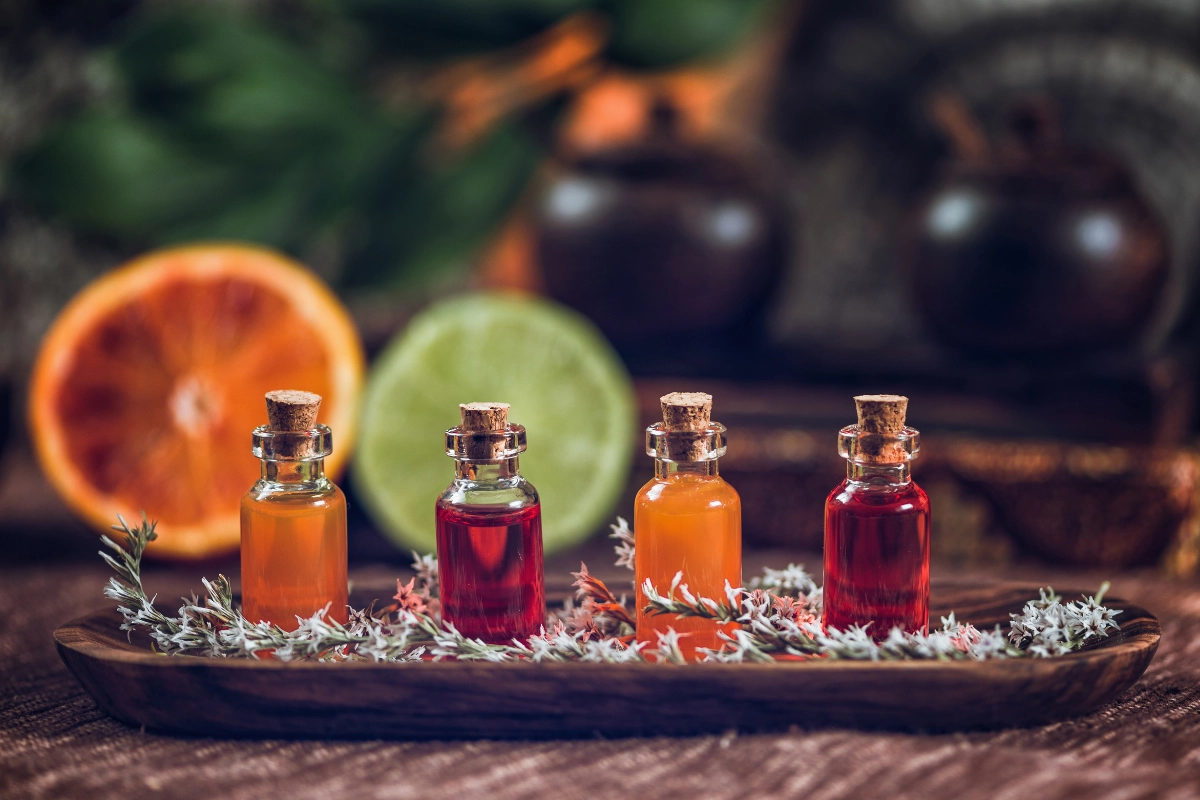Aromatherapy benefits and wellness go hand in hand both for you and your home. Essential oils have amazing healing powers for overall health. Find out about the different ways to use these natural oils to maximize your physical and mental health.
Aromatherapy, or the use of essential oils and aromatic plant extracts for healing, has been in practice for thousands of years. Ancient civilizations such as the Egyptians, Greeks, and Romans used aromatherapy and essential oils in a variety of ways. Even during the Middle Ages, plants were used to treat illnesses, and often aromas were a key component. Today, aromatherapy is still a popular form of treatment though it has changed over time with technology and scientific discoveries.
One blend of essential oils that has regained popularity in recent times was said to have been used by a group of thieves in the 14th century during the bubonic plague. The thieves were said to soak cloth face coverings in a blend of oils thought to protect the user from bacteria. The thieves would wear them to enter the homes of the sick in order to steal their belongings. This blend of oils became known as Thieves Oil.
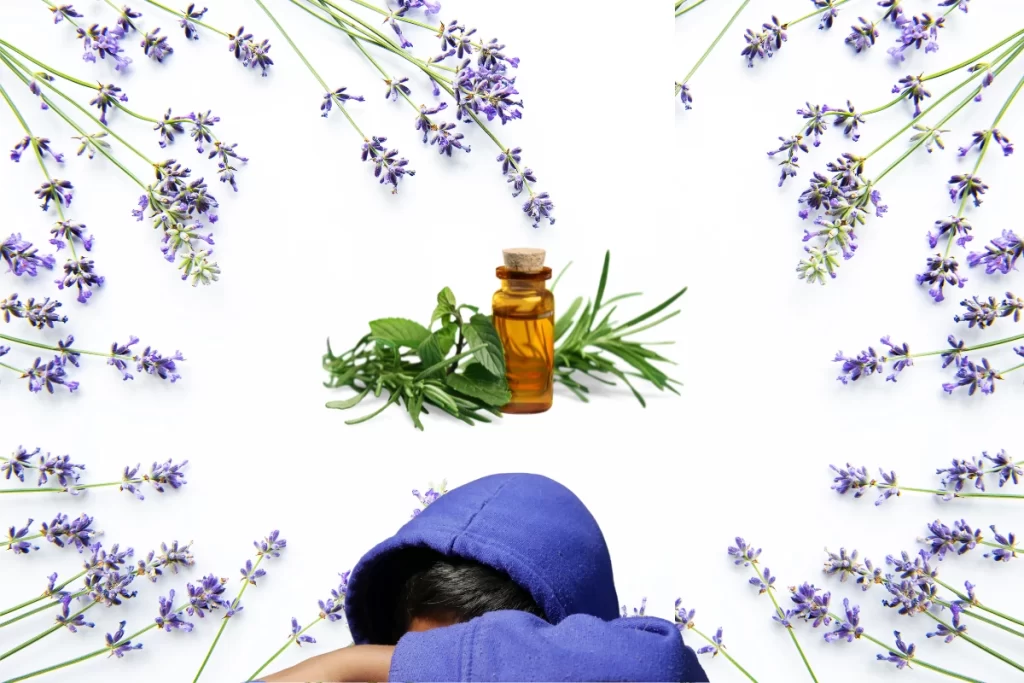
Over time certain essential oils have been studied and found to provide antiviral and antibacterial properties. Discover the benefits of essential oils for you and your home. Essential oils have been used for centuries to promote physical, emotional, and spiritual healing. From helping to ease stress and anxiety to promoting better sleep and clearer skin, these natural oils offer a wide variety of health benefits that can help you live your best life.
What is Aromatherapy and How Can It Help with Healthy Living?
Aromatherapy benefits and wellness aspects can enhance both your health and your home. Aromatherapy is the practice of using natural aromatic compounds from plants to promote physical and mental well-being. These essential oils are typically inhaled or applied topically, where their bioactive compounds can interact with our olfactory systems and skin. Aromatherapy can help reduce stress, enhance mood, improve sleep, boost immunity, and even relieve pain.
Understand the Benefits of Essential Oils
The aromatherapy benefits and wellness aspects cover a wide range of health and home uses. Before you start incorporating essential oils into your health routine, it’s important to understand the various benefits they can provide. Essential oils such as lavender, ylang-ylang, and chamomile are known for promoting relaxation, calming anxiety, and relieving stress. Other oils like tea tree oil can be used topically to help clear up acne, reduce inflammation or heal wounds. With the right understanding of how essential oils can be most beneficial for you, you can begin to explore the different types of oils and create your own unique wellness routine.
Choose the Right Type of Oil for Your Needs
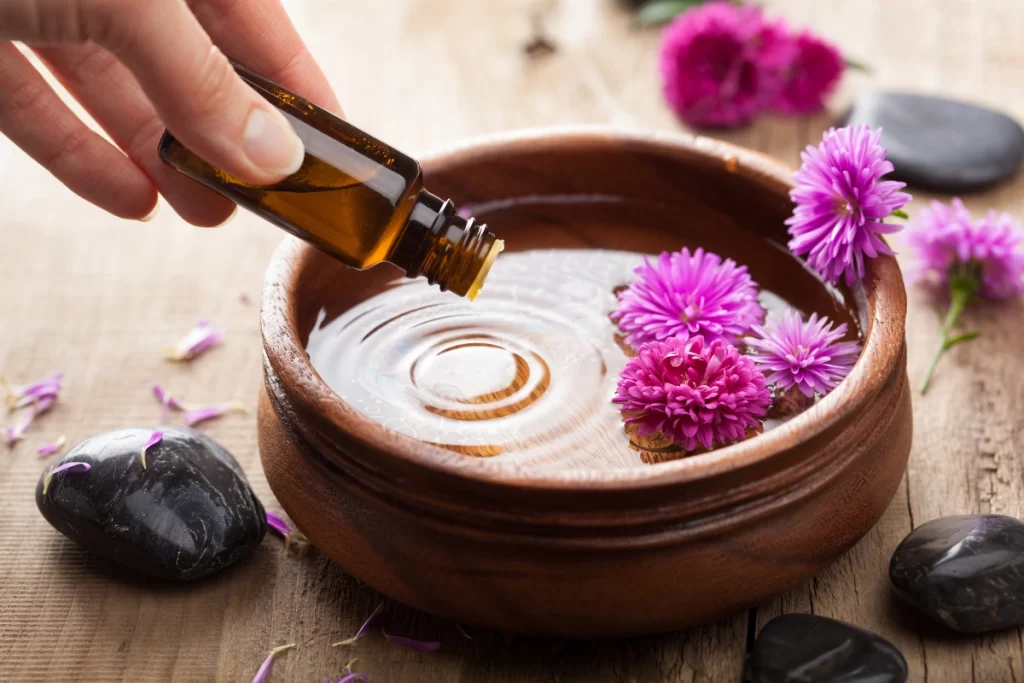
Not all oils are created equal when it comes to their healing powers and knowing which one is right for you can be the key to maximizing your health. Take some time to research the different properties each oil possesses, such as its aroma, uses, safety precautions, and side effects. Depending on your needs, you may want to consider an oil that serves as an energizing tonic or one that is able to boost your immune system. You’ll also want a variety of oils if you’re looking to create specific blends for different scenarios from winding down in the evenings or getting ready for a workout.
Use a Diffuser or Applying Oil Topically
Depending on the essential oil, there are two primary methods for incorporating it into your routine—using a diffuser and/or applying certain oils topically. When using a diffuser, you can take advantage of its aromatherapy benefits; just make sure to dilute your oil if you’re using it for a massage or other topical application. A few drops may be enough when using a diffuser, but greater concentrations are necessary if you plan to apply the oil topically to the body—away from eyes and other sensitive areas.
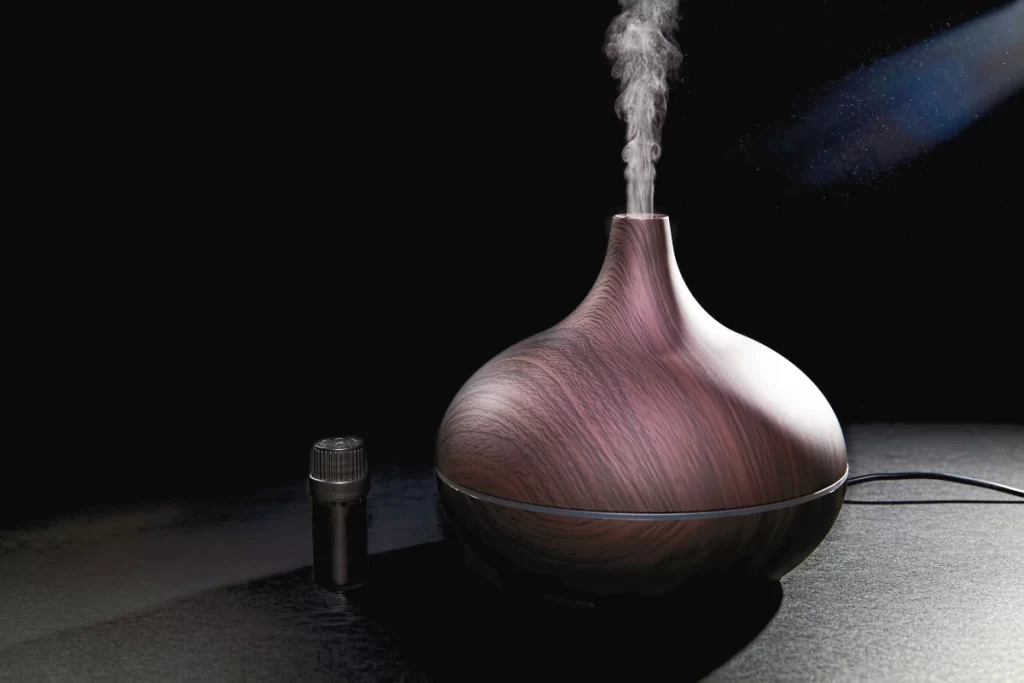
Be Mindful of Any Side Effects or Interactions
While essential oils have plenty of noteworthy benefits, side effects, and interactions may occur. Even if natural, some people are more sensitive to these products than others. For example, certain essential oils can interact with medications or cause skin irritation and allergic reactions. Therefore, it’s always important to read product warnings as needed and do your research before using an oil—or talk to a healthcare professional if you’re not sure about its safety. Working with a trained physician or other qualified alternative practitioners can be helpful in this regard.
Consider Aromatherapy for Stress Relief
Aromatherapy is a holistic therapy that involves the use of fragrance oils for psychological and physical well-being. Aromatherapy may help reduce stress, anxiety, depression, symptoms of premenstrual syndrome (PMS), insomnia, and more. It’s also thought to have positive effects on the cardiovascular, immune, hormonal, and digestive systems of the body in addition to providing overall relaxation and mental clarity. Many essential oil users find that even a few minutes of inhaling a scent can have subtle but immediate effects on their mental state.
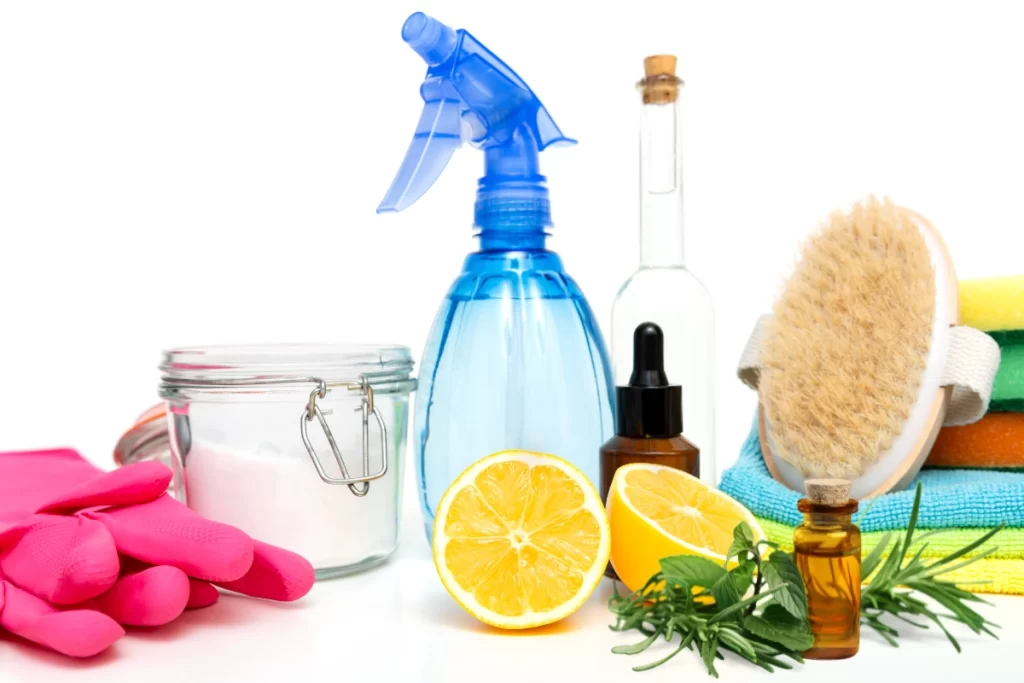
Aromatherapy benefits and wellness effects provide support for you and your home:
- Lavender Essential Oil – One of the most beloved essential oils, lavender has a calming, soothing effect that can help to create an atmosphere of peace and relaxation in any home. Use it as a diffuser oil or add a few drops to your pillow or baths for a spa-like experience in your own home. Lavender also works as an effective cleaning agent and insect repellent.
- Peppermint Oil – The distinctive menthol scent of peppermint oil brings freshness to the home and is known for its energizing effect that can reduce fatigue and stress levels in the long run. Diffuse it around the house or add some drops to your cleaning mixtures and toiletries for an extra refreshing boost.
- Tea Tree Oil – Tea tree oil is one of the best-known essential oils due to its countless uses around the home, be it cleaning, disinfecting surfaces, removing odors, boosting laundry efficiency, or treating colds/flu symptoms in combination with other oils such as eucalyptus or rosemary extract. For safety reasons when using tea tree oil, you should always dilute before applying directly on the skin or inhaling it directly from the bottle.
- Eucalyptus Essential Oil – Providing an uplifting aroma, eucalyptus essential oil has powerful purifying properties that make it perfect for cleansing rooms by dispersing odor particles from furniture or carpets but also skin irritations as part of well-balanced massage blend for minor aches and pains relief (always diluted).
- Lemon Essential Oil – With its sweet citrusy aroma lemon essential oil acts like a natural air freshener when used inside diffusers while giving us the added benefit of improving mood with its invigorating feel when used topically into our bodies via massage blends ( always diluted). It can also be added to our cleaning solutions due to its antibacterial properties so making green household products at home becomes much easier than ever before!
- Rosemary Essential Oil – Rosemary has been associated with enhanced mental clarity – simply putting some drops on our palm and deeply breathing in we ingest this clean herbaceous scent that helps bring stress relief while fighting off mental fatigue at once while having strong disinfectant abilities if used on surface sprays– perfect companion in times of cold flu season!
- Bergamot Essential Oil -Bergamot is a highly sought-after oil for aromatherapy and other therapeutic uses. Bergamot essential oil is a blend of zesty citrus and floral notes. Bergamot essential oil has a bright and invigorating scent, making it perfect for lifting the mood during stressful times, and lifting your mood whenever you are feeling down. Its vibrant energy is a perfect combination for pairing nicely with Lavender essential oil, creating a calming and soothing atmosphere when used in an aromatherapy diffuser. The energizing scent of Bergamot along with the pacifying effect of Lavender essential oil creates the perfect balance for mental stimulation and relaxation.
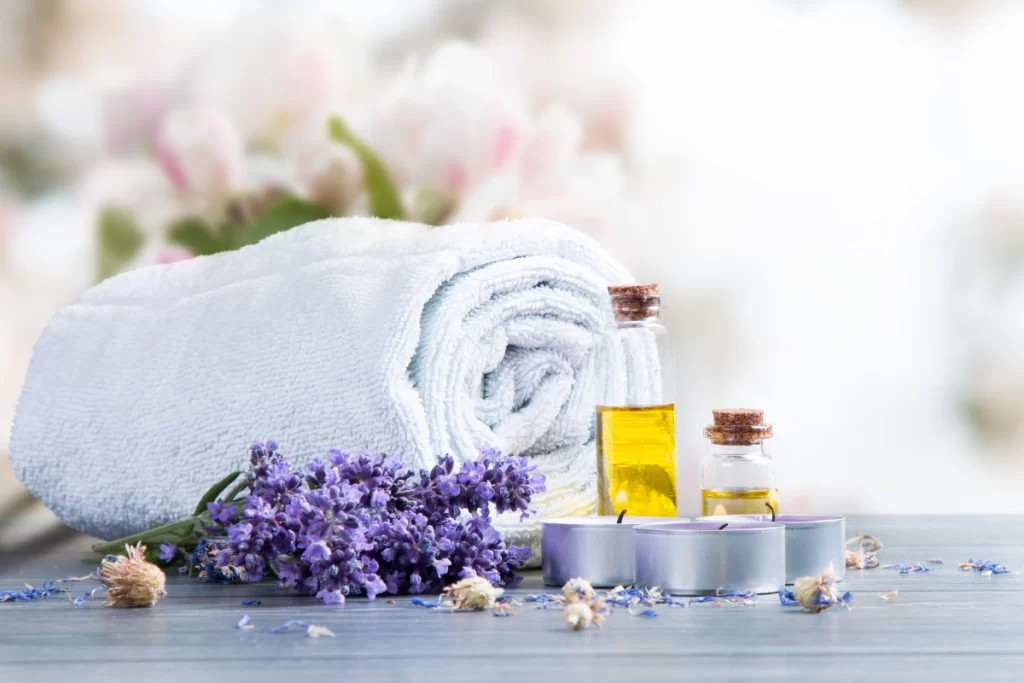
In Conclusion, Aromatherapy Benefits and Wellness
In conclusion, aromatherapy benefits and wellness includes many health aspects. Essential oils can provide a range of physical health benefits, from reducing inflammation to relieving gut issues. They can also promote mental well-being by helping to reduce stress and improve mood. Additionally, essential oils are often used in home fragrancing, as well as a natural (non-toxic) way to clean around the house.
Some of the most popular essential oils used in aromatherapy include lavender, tea tree, eucalyptus, peppermint, rosemary, lemon, and sandalwood. These natural compounds are known to help relax the mind, reduce stress and anxiety levels, improve sleep quality, and boost energy levels.
Read about brain foods here.
Read about folk medicine and 5 Thieves Oil here.
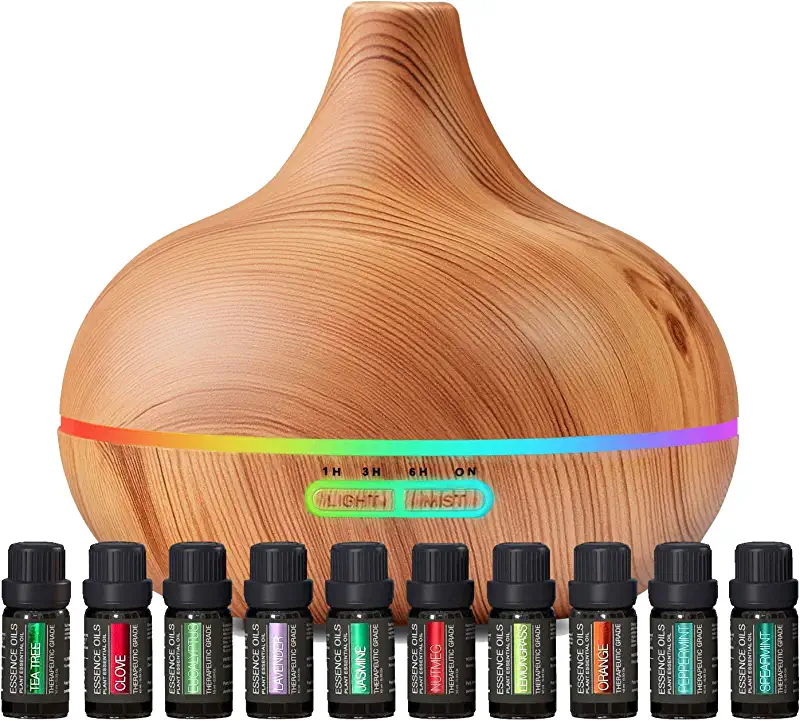
Advertisement
As an Amazon Associate, Omega 3 Tips earns from qualifying purchases.
Ultimate Aromatherapy Diffuser & Essential Oil Set
ADD ADHD Alzheimers antioxidants arthritis Best Sources of Omega 3 6 9 Fatty Acids cancer exercise fatty acids fatty fish fermented foods fish oil flax seed oil health benefits healthy diet Healthy Lifestyle healthy lifestyle benefits healthy lifestyle food Healthy Weight loss heart disease herring hummus indoor herb garden grow light indoor herb garden kits indoor herb garden on wall indoor herb garden planters jackfruit joint stiffness mackerel meditation mental health mushrooms oily fish omega-3 omega-3 fatty acids omega 3 6 9 risks and side effects Omega3tips.com salmon sardines super foods tuna unplug vitamins Weight loss wellness
Thieves oil is a blend of essential oils thought to have antibacterial, antiviral, and antifungal properties. When used aromatically or topically, thieves oil is said to help fight off infections and provide relief from headaches, congestion, and cold and flu symptoms. Thieves Oil is generally a combination of five essential oils: clove, cinnamon bark, rosemary, lemon, and eucalyptus. There are various recipes for thieves’ oil all of which vary slightly. It was first formulated by French thieves in the 14th century who used it as a method to ward off illness when stealing from homes where someone was ill. Today, Thieves oil is widely used for its antiviral and antibacterial properties – perfect for diffusing during cold and flu season!
Carrier oils are those used to dilute essential oils and absolutes before they are applied to the skin in the practice of aromatherapy. They help provide a smooth, even application of the more potent therapeutic oils and allow for better absorption into the body. Common carrier oils include sweet almonds, coconut, jojoba, sunflower, and grapeseed oil.
There are roughly 300 varieties of essential oils in the world, and each offers a myriad of benefits depending on their use. Some of the most popular types include lavender, peppermint, eucalyptus, frankincense, tea tree oil, and rosemary.
The use of aromatherapy can have a wide range of benefits, from improved mental health to physical health. Aromatherapy has the potential to reduce stress and anxiety, improve sleep quality, increase energy levels, as well as promote healing. However, there are some drawbacks associated with aromatherapy that should be considered before beginning any treatment. These include possible skin irritation and increased allergy susceptibility when exposed to certain essential oils.

